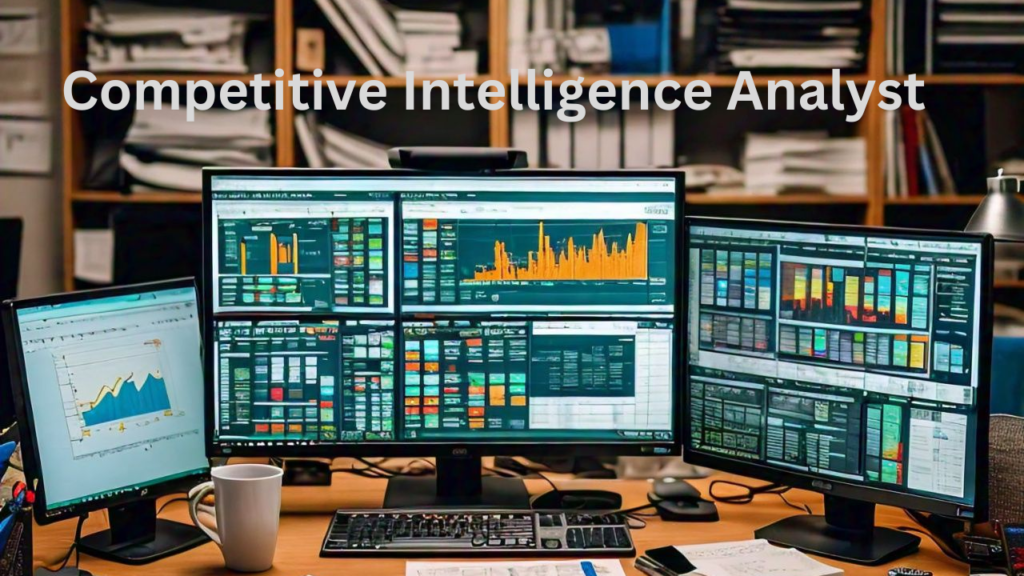In moment’s competitive business world, staying ahead of assiduity trends and understanding your challengers is pivotal for success. One of the crucial players in achieving this is a Competitive Intelligence analyst. This professional is responsible for collecting and assaying data about challengers, request trends, and assiduity developments to give strategic perceptivity that help associations maintain a competitive edge. In this composition, we explore the liabilities, crucial chops, and significance of the Competitive Intelligence Specialist in the ultramodern business geography.
What Does a Competitive Intelligence Analyst Do?
A Competitive Intelligence analyst plays a pivotal part in helping associations make data- driven opinions by furnishing precious perceptivity into challengers, request trends, and assiduity shifts. This information allows businesses to stay competitive, alleviate pitfalls, and identify openings for growth. Let’s break down the crucial liabilities of a CI critic.
1. Data Collection
The primary task of a Competitive Intelligence Expert is to gather data from colorful sources. These sources may include contender websites, assiduity reports, news papers, public forms, social media, and more. The thing is to collect information about contender strategies, new product launches, pricing models, and consumer comprehensions.
crucial areas of data collection include
- contender product immolations and pricing strategies
- Arising request trends and consumer geste
- fiscal performance and crucial criteria of challengers
- Regulatory changes affecting the assiduity
2. Analysis and Interpretation
Once the data is collected, the coming step is to dissect it. The CI critic looks for patterns, trends, and perceptivity that can impact business opinions. This involves using a variety of logical tools and fabrics similar as SWOT analysis, competitive benchmarking, and trend analysis to prize practicable perceptivity from raw data.
crucial logical tasks include
- SWOT( Strengths, sins, openings, pitfalls) analysis to assess challengers
- Trend analysis to identify arising request shifts
- Benchmarking against assiduity norms and challengers
- Gap analysis to pinpoint areas where the company can ameliorate or subsidize on openings
3. Reporting and Decision Support
After assaying the data, the CI critic prepares detailed reports, donations, and dashboards to partake their findings with company stakeholders. These perceptivity inform business strategies, marketing plans, product development, and indeed threat operation.
A Competitive Intelligence Strategist should present complex information in a clear, practicable format, helping decision- makers understand
- The competitive geography
- openings for request expansion or product diversification
- Areas of competitive advantage and disadvantage
By transubstantiating raw data into meaningful perceptivity, the CI critic ensures that business leaders have the information they need to make informed, strategic opinions.
Skills Required for Success in This Role
To exceed in the part of a Competitive Intelligence Consultant, professionals must retain a combination of logical, exploration, and communication chops. Below are some of the essential chops for a CI critic
- Analytical Allowing The capability to reuse and interpret large volumes of data and excerpt meaningful perceptivity.
- Research Chops Expertise in sourcing information from both public and personal databases, online coffers, and request reports.
- Specialized Proficiency Knowledge of data analysis tools like Excel, Tableau, Power BI, and business intelligence software.
- Assiduity Knowledge Understanding the specific request and assiduity dynamics to make data more applicable.
- Communication Chops The capability to restate complex data into clear, practicable perceptivity for decision- makers.
- Attention to Detail A keen eye for small details in data that could lead to significant perceptivity about challengers or request shifts.
Why is Competitive Intelligence Important?
Competitive intelligence is essential for agencies that want to hold a competitive benefit. The part of a CI critic is integral to this trouble, furnishing businesses with practicable perceptivity to navigate the complications of the request. Then are some of the crucial reasons why CI is so important
1. Informed Decision- Making
CI judges help decision- makers access timely, accurate, and practicable data, enabling them to make well- informed choices. Whether it’s launching a new product, entering a new request, or conforming marketing strategies, data- driven perceptivity are inestimable.
2. Anticipating request Shifts
By nearly covering challengers and assiduity trends, a Competitive Intelligence Consultant can read implicit shifts in the request. This allows businesses to proactively acclimate their strategies and stay ahead of arising challengers.
3. Threat Mitigation
Through CI, companies can identify implicit pitfalls beforehand on, similar as a contender’s new product launch or an arising assiduity trend. With this information, businesses can concoct strategies to alleviate pitfalls and cover their request share.
4. Spotting openings
CI is n’t just about defending against pitfalls; it’s also about relating new openings. Whether it’s a new request member, product invention, or cooperation eventuality, the perceptivity handed by CI judges can uncover paths for growth and diversification.
Tools and ways Used by Competitive Intelligence Judges
Competitive Intelligence Judges calculate on a wide range of tools and ways to gather and dissect data. Some of the most common tools include
- Google cautions and SEMrush These tools help cover contender conditioning online, including website changes, content, and social media posts.
- SpyFu and Ahrefs Used to track contender hunt machine strategies and keyword performance.
- Crunchbase and Owler Platforms that give fiscal and business information about challengers.
- Social Media Monitoring Tools Platforms like Hootsuite or BuzzSumo help track challengers’ social media presence and engagement.
- Business Intelligence Software Tools like Tableau or Power BI help fantasize data, enabling CI judges to spot trends and patterns snappily.
crucial Takeaways
Then are some important points to flash back about the part of a Competitive Intelligence Analyst
- A CI critic provides businesses with perceptivity into challengers, request trends, and assiduity developments, enabling strategic decision- timber.
- The part involves data collection, analysis, and the donation of findings to business leaders.
- crucial chops for a CI critic include logical thinking, exploration proficiency, specialized chops, and effective communication.
- Competitive intelligence helps businesses stay ahead of challengers, spot openings, and alleviate pitfalls.
- CI judges use a variety of tools to gather and dissect data, similar as business intelligence software, social media shadowing tools, and contender monitoring platforms.
The Growing Demand for Competitive Intelligence Judges
As the business world becomes decreasingly competitive and data- driven, the demand for Competitive Intelligence Judges continues to grow. Companies across colorful diligence, from technology to retail, are feting the significance of competitive intelligence in gaining a request advantage. With businesses constantly seeking to outmaneuver challengers, CI judges are seen as inestimable means. also, the rapid-fire elaboration of digital tools and data analytics ways is expanding the compass of a CI critic’s part, making it more dynamic and poignant. As businesses continue to prioritize data- driven strategies, the need for professed judges who can transfigure complex data into practicable perceptivity will only increase, solidifying the position of competitive intelligence as a pivotal function within associations.
Conclusion
The part of a Competitive Intelligence is getting decreasingly important in moment’s presto- paced and data- driven business world. By furnishing businesses with the perceptivity they need to make informed opinions, anticipate request changes, and outpace challengers, CI judges play a pivotal part in a company’s long- term success. With the right chops, tools, and moxie, competitive intelligence judges are integral to navigating the complications of the ultramodern business geography.


